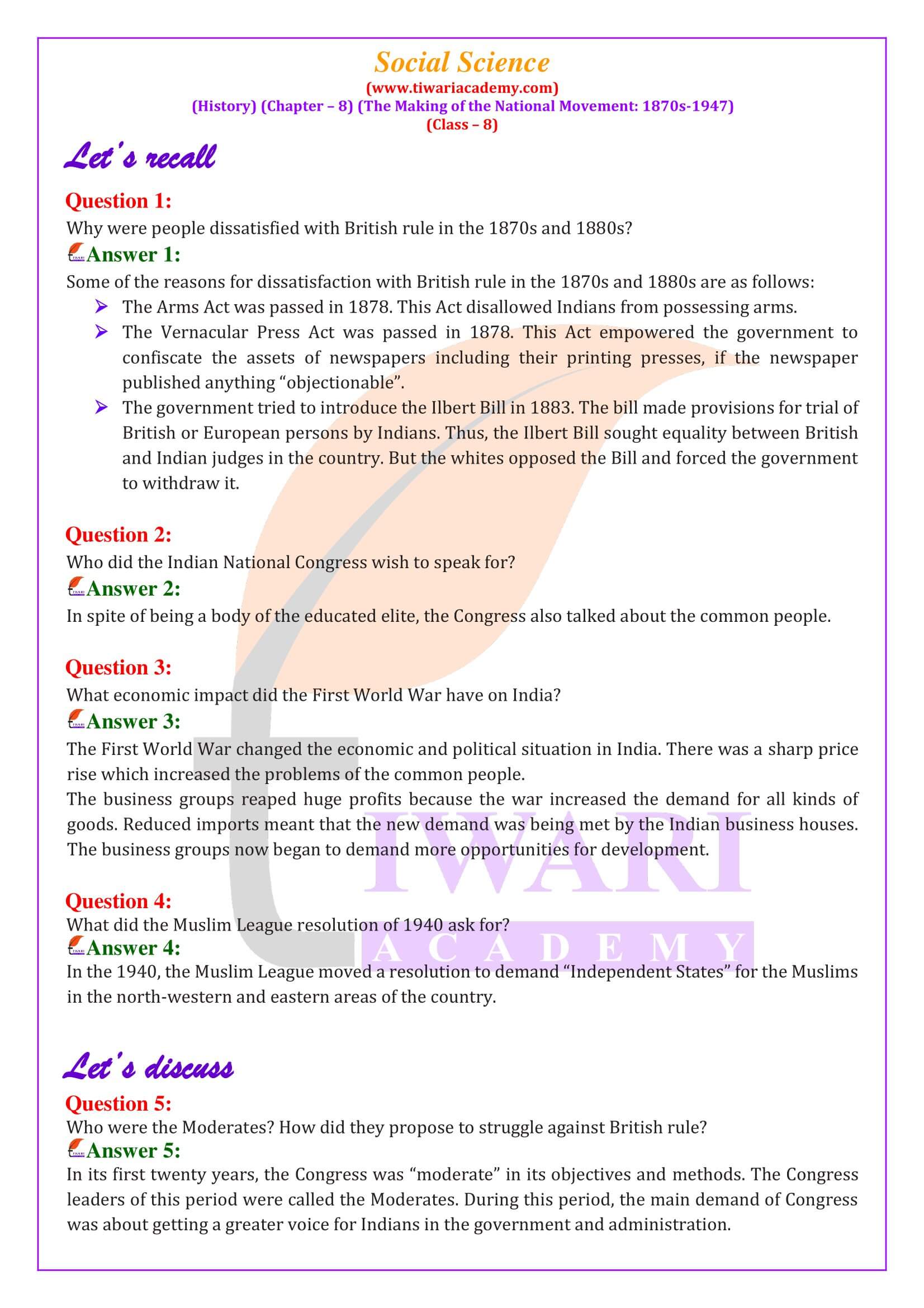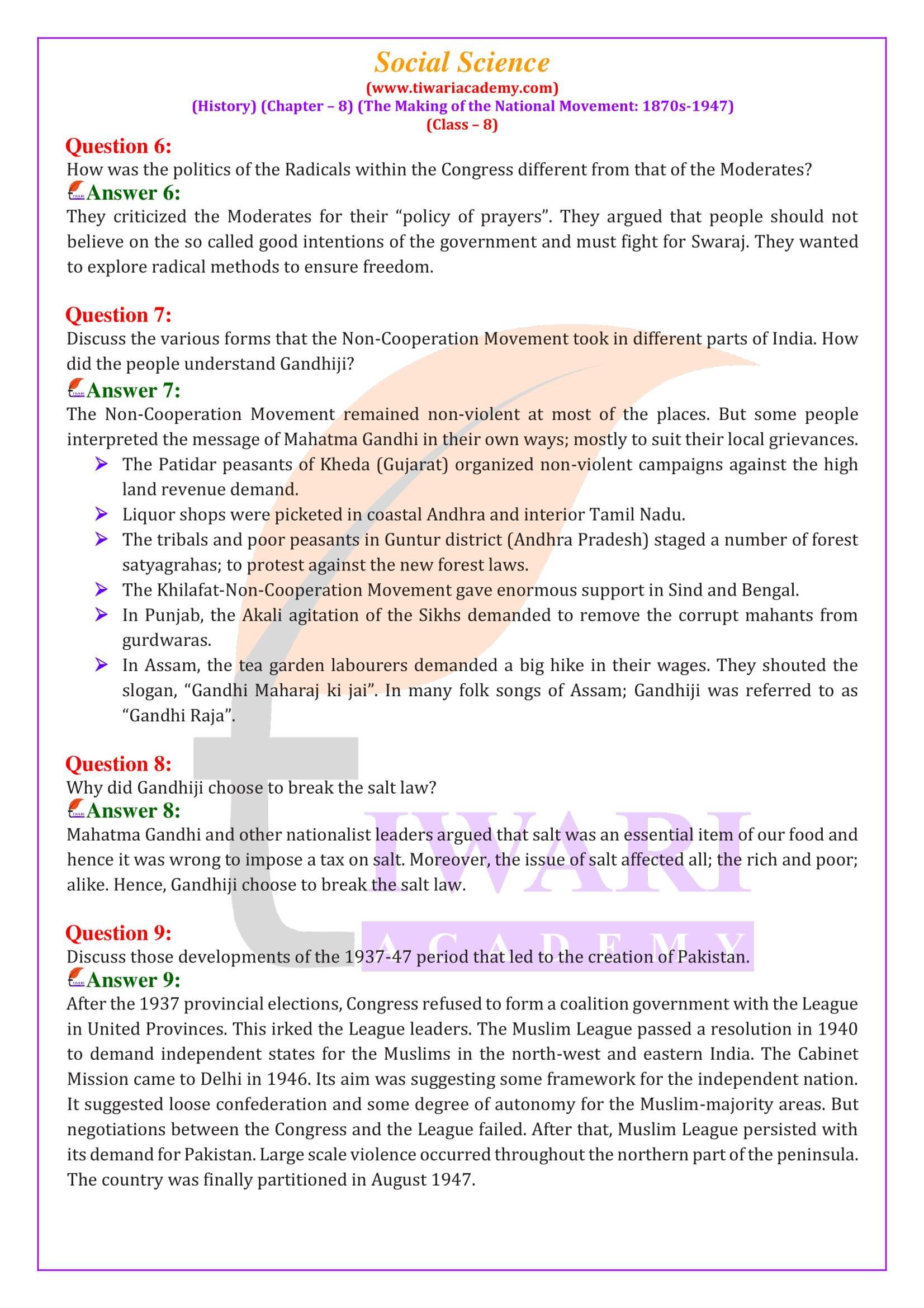NCERT Solutions for Class 8 Social Science History Chapter 8 The Making of the National Movement: 1870s – 1947 in English Medium revised for academic session 2024-25. Class VIII History chapter 8 solutions are modified and updated according to rationalised NCERT books for 2024-25 exams.
NCERT Solutions for Class 8 Social Science History Chapter 8
Download NCERT Solutions Offline Apps based on latest NCERT Books 2024-25 and NCERT Solutions for other subjects also. Join the DISCUSSION FORUM to share your knowledge.
Class 8 History Chapter 8 Extra Questions
Describe ‘A nation in the making’.
It has often been said that the Congress in the first twenty years was “moderate” in its objectives and methods. During this period it demanded a greater voice for Indians in the government and in administration. It wanted the Legislative Councils to be made more representative, given more power, and introduced in provinces where none existed. It demanded that Indians be placed in high positions in the government.
Accoding to this chapter comment on the “Freedom is our birthright”.
By the 1890s, in Bengal, Maharashtra and Punjab, leaders such as Bepin Chandra Pal, Bal Gangadhar Tilak and Lala Lajpat Rai were beginning to explore more radical objectives and methods. They criticised the Moderates for their “politics of prayers” and emphasised the importance of self-reliance and constructive work. They argued that people must rely on their own strength, not on the “good” intentions of the government; people must fight for swaraj. Tilak raised the slogan, “Freedom is my birthright and I shall have it!”
What was the Growth of Mass Nationalism?
1. After 1919 the struggle against British rule gradually became a mass movement, involving peasants, tribals, students and women in large numbers and occasionally factory workers as well. Certain business groups too began to actively support the Congress in the 1920s.
The First World War
2. The First World War altered the economic and political situation in India. It led to a huge rise in the defence expenditure of the Government of India. The government in turn increased taxes on individual incomes and business profits. Increased military expenditure and the demands for war supplies led to a sharp rise in prices which created great difficulties for the common people. On the other hand, business groups reaped fabulous profits from the war.
Class 8 History Chapter 8 Question Answers
CBSE NCERT Solutions for Class 8 Social Science History Chapter 8 The Making of the National Movement: 1870s – 1947 is given below in updated form for session 2024-25. Download these solutions and offline apps for new academic session free of cost. If you have any doubt, please contact us or describe in Discussion Forum.
| Class: 8 | Social Science |
| Subject: | History |
| Chapter 8: | The Making of the National Movement: 1870s – 1947 |
| Content: | Textbook Exercise Answers |
| Content Type: | Text and Online Images |
Important Questions on 8th History Chapter 8
Why were people dissatisfied with British rule in the 1870s and 1880s?
Some of the reasons for dissatisfaction with British rule in the 1870s and 1880s are as follows: The Arms Act was passed in 1878. This Act disallowed Indians from possessing arms. The Vernacular Press Act was passed in 1878. This Act empowered the government to confiscate the assets of newspapers including their printing presses, if the newspaper published anything “objectionable”. The government tried to introduce the Ilbert Bill in 1883. The bill made provisions for trial of British or European persons by Indians. Thus, the Ilbert Bill sought equality between British and Indian judges in the country. But the whites opposed the Bill and forced the government to withdraw it.
Who did the Indian National Congress wish to speak for?
In spite of being a body of the educated elite, the Congress also talked about the common people.
What did the Muslim League resolution of 1940 ask for?
In the 1940, the Muslim League moved a resolution to demand “Independent States” for the Muslims in the north-western and eastern areas of the country.
Who were the Moderates? How did they propose to struggle against British rule?
In its first twenty years, the Congress was “moderate” in its objectives and methods. The Congress leaders of this period were called the Moderates. During this period, the main demand of Congress was about getting a greater voice for Indians in the government and administration.
How was the politics of the Radicals within the Congress different from that of the Moderates?
They criticized the Moderates for their “policy of prayers”. They argued that people should not believe on the so called good intentions of the government and must fight for Swaraj. They wanted to explore radical methods to ensure freedom.
Discuss the various forms that the Non-Cooperation Movement took in different parts of India. How did the people understand Gandhiji?
The Non-Cooperation Movement remained non-violent at most of the places. But some people interpreted the message of Mahatma Gandhi in their own ways; mostly to suit their local grievances. The Patidar peasants of Kheda (Gujarat) organized non-violent campaigns against the high land revenue demand. Liquor shops were picketed in coastal Andhra and interior Tamil Nadu. The tribals and poor peasants in Guntur district (Andhra Pradesh) staged a number of forest satyagrahas; to protest against the new forest laws. The Khilafat-Non-Cooperation Movement gave enormous support in Sind and Bengal. In Punjab, the Akali agitation of the Sikhs demanded to remove the corrupt mahants from gurdwaras. In Assam, the tea garden labourers demanded a big hike in their wages. They shouted the slogan, “Gandhi Maharaj ki jai”. In many folk songs of Assam; Gandhiji was referred to as “Gandhi Raja”.
Why did Gandhiji choose to break the salt law?
Mahatma Gandhi and other nationalist leaders argued that salt was an essential item of our food and hence it was wrong to impose a tax on salt. Moreover, the issue of salt affected all; the rich and poor; alike. Hence, Gandhiji choose to break the salt law.
Discuss those developments of the 1937-47 period that led to the creation of Pakistan.
After the 1937 provincial elections, Congress refused to form a coalition government with the League in United Provinces. This irked the League leaders. The Muslim League passed a resolution in 1940 to demand independent states for the Muslims in the north-west and eastern India. The Cabinet Mission came to Delhi in 1946. Its aim was suggesting some framework for the independent nation. It suggested loose confederation and some degree of autonomy for the Muslim-majority areas. But negotiations between the Congress and the League failed. After that, Muslim League persisted with its demand for Pakistan. Large scale violence occurred throughout the northern part of the peninsula. The country was finally partitioned in August 1947.
Important Notes on 8th History Chapter 8
The Arms Act was passed in 1878, disallowing Indians from possessing arms. In the same year the Vernacular Press Act was also enacted in an effort to silence those who were critical of the government.
The Act allowed the government to confiscate the assets of newspapers including their printing presses if the newspapers published anything that was found “objectionable”. In 1883, there was a furore over the attempt by the government to introduce the Ilbert Bill. The bill provided for the trial of British or European persons by Indians, and sought equality between British and Indian judges in the country.






